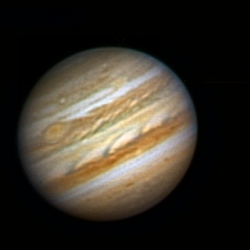
The Planet Jupiter by Mike Salway
Thirty years ago the clearest views of the planet Jupiter could only be obtained from multi-million dollar robotic space probes, like the twin Voyager missions sent to survey the outer planets. As recently as five years ago, the atmosphere still hopelessly blurred views of Jupiter, or any other planet, seen from the surface of the Earth through telescopes. All of that has changed thanks to the digital revolution in photography. Now, people with the interest, a modest telescope and a common web camera can learn to take planetary portraits that rival some the best from NASA.
The accompanying photographs of Jupiter and its moon Ganymede, in orbit around the Sun, 365 million miles from our planet, were produced by Mike Salway, an Australian amateur astronomer using a unguided 10 inch Dobsonian telescope and a ToUCam web camera. The pictures were produced from images taken on March 12, 2006. The clarity of each image is similar to pictures taken by Voyager after it had traveled over 90 percent of the distance from Earth to Jupiter.
Taking planetary images from the ground using modest equipment is still a daunting challenge that requires patience, ingenuity and talent. For example, each of the three pictures featured here required Mike to take 450 separate exposures at five frames per second over a space of ninety seconds. Using commercially available software to pick out the best frames, Mike was able to identify the clearest images from each set, digitally combine then enhance them and produce one final picture.
Mike not only captured this trio of beautiful images, he created a short sixteen-frame movie showing the planet in rotation! Each frame is separated by approximately five minutes; therefore the movie spans the planet’s rotation over a period of almost an hour and a half. The clarity of this animation also harks back to those taken as Voyager approached Jupiter in 1979.
One of the three images has been arrowed to indicate the location of a new storm in Jupiter’s atmosphere that has taken on the same hues and characteristics of the Great Red Spot – a storm that has persisted for over three hundred years. Nicknamed Red Jr, this new disturbance is still quite huge and capable of swallowing several Earths.
Do you have photos you’d like to share? Post them to the Universe Today astrophotography forum or email them, and we might feature one in Universe Today.
Written by R. Jay GaBany

It seems like something is missing, no?